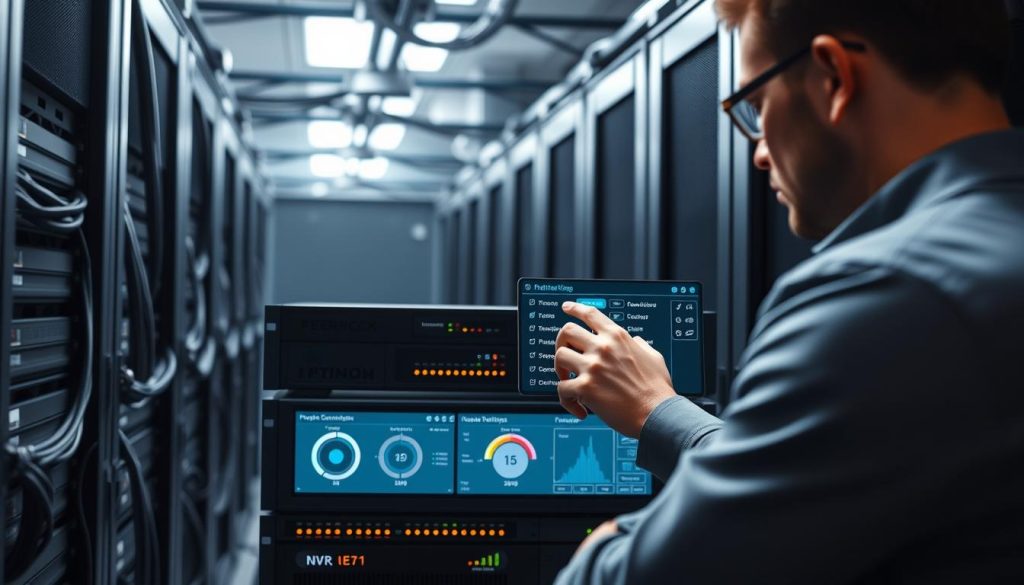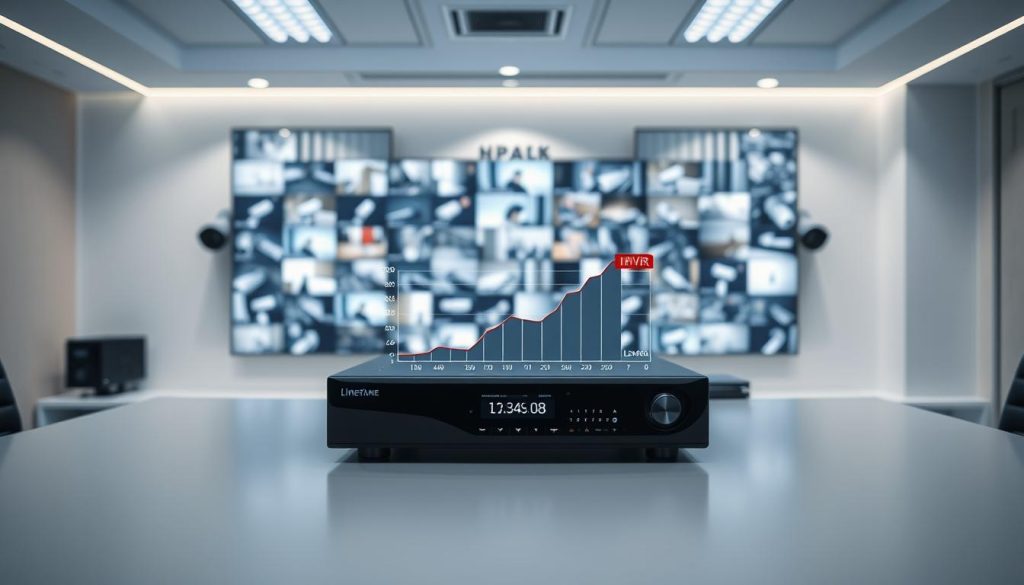The lifespan of a Network Video Recorder (NVR) is key for those investing in video surveillance. NVRs usually last from 3 to 5 years. This period is critical for their performance and the security they provide.
Many factors affect how long an NVR works well. These include how it’s used, new NVR technology, upkeep, and where it’s placed. Knowing these can help users keep their systems running smoothly and improve security over time.
Key Takeaways
- NVRs typically last between 3 to 5 years.
- Durability is influenced by usage patterns and technology advancements.
- Regular maintenance can extend the operational lifespan of NVRs.
- Environmental factors play a critical role in NVR performance.
- Understanding the lifespan is essential for effective video surveillance management.
Understanding NVR Technology
Network Video Recorders (NVRs) are a big step forward in NVR technology. They are made to handle video from IP cameras. Unlike old DVRs, NVRs work with digital signals, giving better video quality and more storage options.
An NVR acts as a main point for video management. It lets users access video from anywhere and supports features like motion detection. This makes it easy to manage many IP cameras at once, making NVRs popular in today’s surveillance systems.
NVR systems are also great because they can grow with your needs. They fit well in both business and home settings. This makes them very versatile.
Factors Influencing the Lifespan of NVR
Knowing what affects NVR lifespan is key to getting the most out of these devices. The quality of parts matters a lot. High-quality parts can handle more wear and tear over time.
Using an NVR a lot can make it wear out faster. This is because it gets stressed from being used a lot.
Where you put your NVR also matters. Extreme temperatures and high humidity can damage it. So, it’s important to choose a good spot for it.
Keeping your NVR in good shape is essential. Regular updates and checks can catch problems early. Taking care of your NVR helps it last longer and work better.
What is the lifespan of NVR?
The typical NVR lifespan is usually between 3 to 5 years. This can change based on the model and how well it’s maintained. Reliability is key to its long-term performance. Keeping it in good shape can make it last longer.
As new tech comes out, older NVRs might not keep up. This can make them less efficient. Even if they work, users might want to upgrade. Knowing how long an NVR lasts helps when choosing a security system.
Typical Lifespan of Different NVR Types
There are many NVR types, each for different surveillance needs. This affects how long an NVR lasts. High-performance NVRs, used in tough spots, can last 5 to 10 years with care. On the other hand, simpler models might only last 3 to 5 years.
Several things affect how long an NVR lasts, including:
- Quality of the components used
- Technological advancements integrated within the system
- Environmental conditions where the NVR operates
Knowing about these differences helps people pick the right NVR for their needs. Some might choose advanced systems for longer life. Others might be okay with simpler models.
Maintenance Practices for Extending NVR Lifespan
Keeping your NVR in good shape is key to making it last longer and work better. A regular maintenance plan helps you stay ahead of problems. This makes your NVR more reliable.
- Regular Cleaning: Dust and dirt can build up and cause your NVR to overheat. Clean it out regularly to keep it cool.
- Firmware Updates: It’s important to keep your NVR’s firmware up to date. Updates often fix bugs and improve performance. Check for updates often.
- Routine Inspections: Look for signs of damage, like frayed cables or loose connections. Catching these early can save you from big problems later.
- Adequate Ventilation: Make sure your NVR has enough room to breathe. Good airflow helps prevent overheating and keeps it running longer.
- Protective Covers: Use covers to keep dust and other environmental factors away from your NVR. This protects its sensitive parts.
Following these NVR maintenance tips can really make a difference. A well-cared-for NVR works better and is less likely to break down unexpectedly.
Environmental Factors Affecting NVR Durability
Environmental conditions greatly affect how long NVR systems last. Too much humidity can cause corrosion inside. On the other hand, very hot or cold temperatures can lead to overheating or damage.
Dust can also be a problem. It can mess with the electrical connections and cooling systems. This can make the NVR less reliable.
Outdoor NVRs face even tougher challenges. They are exposed to all kinds of weather. It’s important to choose NVRs with strong, sealed cases.
These systems should also have ways to control temperature and keep moisture out. This helps them work better in harsh conditions.
Checking how the environment affects your NVR can help it last longer. Keep an eye on temperature and humidity levels. This way, you can fix problems before they start.
Being proactive helps your NVR system work well, even when the weather changes. It’s all about taking care of your NVR to make it last.
Comparing NVR and DVR Lifespan
When looking at the NVR vs DVR lifespan, we see big differences. NVRs usually last from 5 to 10 years. This is because they handle digital video streams from IP cameras well. On the other hand, DVRs last about 3 to 5 years. They use analog inputs, which limits their lifespan.
NVRs have a big plus: they can grow with technology. Users can easily add more features as needed. DVRs, though, can be harder to upgrade. This shows why it’s important to think about a video storage comparison before buying.
Signs that Your NVR Needs Replacement
Knowing when to replace your NVR is key to a good surveillance system. A big drop in video quality is a clear sign. It makes recorded footage less clear and less useful.
Also, if your NVR keeps losing connection, it’s a sign it’s getting old. This can make it hard to watch live or recorded videos. It’s frustrating and can lead to security problems.
Other signs include hardware problems like controls that don’t work or slow speeds. If using your NVR gets harder or if it can’t work with new systems, it’s time for a new one. Spotting these problems early helps keep your security system running smoothly.
How to Optimize Your NVR Performance
To improve NVR performance, you need to take proactive steps and maintain it regularly. Make sure the firmware is always updated. This keeps your system secure and adds new features that boost performance.
Adjusting camera settings is also key for NVR performance optimization. Tailoring these settings can enhance image quality and save system resources.
It’s vital to have enough storage for recorded footage. Regularly check and manage storage to avoid performance issues. Also, having a backup plan is important to protect your data and ensure quick recovery if needed.
Regularly monitoring your system’s performance is essential for effective management. This lets you spot problems early and fix them quickly. By following these steps, you can keep your NVR running smoothly and reliably.

Future Trends in NVR Technology and Lifespan
NVR technology is changing fast, with companies working to make it last longer and work better. One big change is using artificial intelligence for better video analysis. This makes monitoring quality go up and reduces wear on the hardware.
As things get better, NVRs will use smarter algorithms that adjust to changing security needs. This means they’ll work better in real-time.
Also, making data encryption stronger is key for future NVRs. This will keep recorded footage safe from unauthorized access. Such steps will make security stronger and help NVRs last longer by avoiding cyber threats.
Another trend is making NVRs work with more cameras and adding cloud storage. This will give users more flexibility and better ways to manage their surveillance. These changes will change how we handle security, making it more efficient and lasting.

